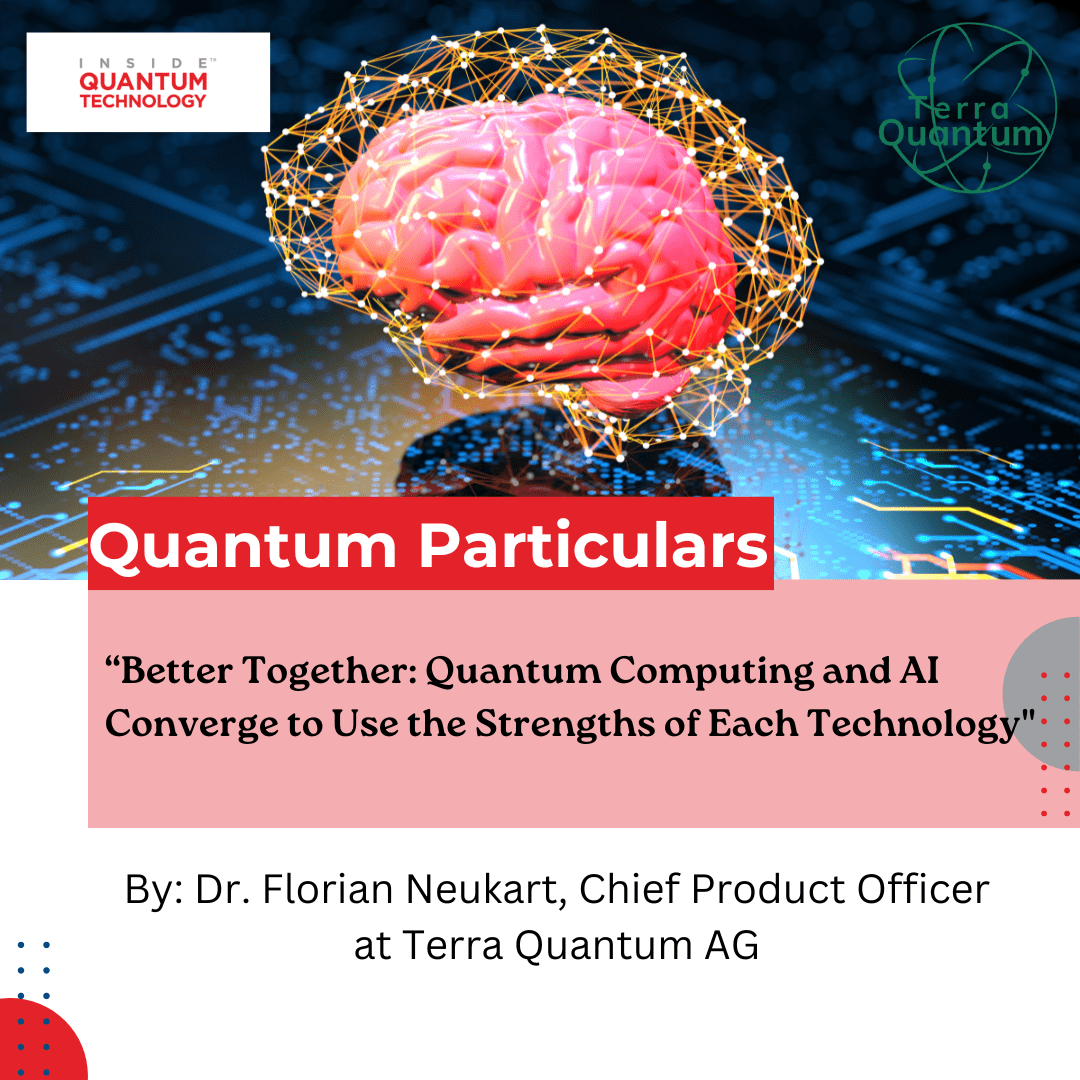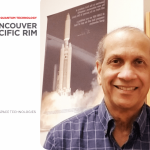Quantum Particulars Guest Column: “Better Together: Quantum Computing and AI Converge to Use the Strengths of Each Technology”

“Quantum Particulars” is an editorial guest column featuring exclusive insights and interviews with quantum researchers, developers, and experts looking at key challenges and processes in this field. This article, focusing on the interactions between quantum computing and AI, was written by Dr. Florian Neukart, Chief Product Officer at Terra Quantum AG.
Quantum computing (QC) and artificial intelligence (AI) are actively reshaping our strategies to address complex challenges across various sectors. QC offers unprecedented speed and processing capabilities far exceeding traditional computers, introducing a new computational paradigm. Meanwhile, AI has evolved from theoretical speculation to practical implementation, enhancing its ability to interpret data, predict outcomes, and make decisions with heightened precision.
The convergence of QC and AI is not a scenario where one technology dominates; rather, it is a collaborative integration where each amplifies the other’s strengths. Hybrid quantum computing represents this integration, a merger between quantum and classical computing technologies and software, including classical chips and memory, quantum chips and memory, operating systems and algorithms.
Far from being a mere interim solution, hybridization is the strategic direction. Hybrid systems employ QC for specialized tasks such as molecular simulations or parts of optimization and machine learning algorithms. At the same time, classical computers excel in managing data storage, specific algorithms processing, and user interfaces.
This integration is transformative, making QC not only accessible but also functional in both legacy and new applications. The synergy of QC with AI does more than accelerate computations; it facilitates new forms of analysis, problem resolution, and innovation, addressing previously insoluble problems. Whether pioneering new medications, enhancing supply chain logistics, or making weather forecasts more precise, the hybrid approach introduces us to previously unimagined possibilities.
Theoretical Foundations In QC and AI
At first impression, the pairing of QC and AI may appear incongruous – we often hear about QC or AI, instead of one empowering the other. QC gets its remarkable power from the laws of quantum mechanics, utilizing qubits whose capabilities go beyond the binary constraints of traditional bits to occupy multiple states simultaneously. This characteristic enables quantum computers to perform complex computations at a speed unachievable by classical computers.
Conversely, AI, particularly, machine learning, excels in analyzing extensive datasets, recognizing patterns, and extrapolating predictions and decisions. The true potential is realized when hybrid QC powers ML algorithms. The objective in hybrid QC is not the simple replacement of conventional silicon processors with quantum counterparts;, it is the strategic employment of QC to address particular parts of an ML problem that are hard or even beyond the scope of classical computation, such as simulating quantum phenomena or enhancing the efficiency in learning tasks, such as the training of computationally most intensive last layer in an image classification artificial neural network, while classical systems continue to manage other tasks, such as the execution of the trained model.
Let us consider traffic flow optimization for a metropolitan area. A classical computer would methodically explore each potential route in sequence, while a quantum computer can evaluate numerous paths for multiple vehicles and their interactions in unison, thus identifying the optimal solution with far greater rapidity.
A hybrid system, on the other hand, could leverage the power of QC to model and optimize traffic flows with a level of detail and precision that classical systems cannot achieve. In tandem, AI algorithms can process this information to predict traffic patterns, reduce congestion, and enhance route efficiency. This integration not only improves the daily commute for millions but also has far-reaching implications for logistics, where it can lead to more efficient delivery routes, reduced fuel consumption, and lower carbon emissions.
Also, QC can drastically enhance the speed of data analysis, which is crucial for the training phase of AI systems. At the same time, AI contributes to refining quantum algorithms and ensuring the integrity of quantum computations through error correction.
Such reciprocal optimization underscores the strength of the hybrid model, signifying a solid and adaptable route toward a future in which the combined potential of quantum computing and AI is fully unleashed.
Current Integration Across Industries
As of today, the fusion of QC and AI is already beyond theoretical discourse and is currently being applied in various fields. Here are a few examples:
- Finance: In financial modeling where prediction and risk assessment are paramount, integrating quantum-enhanced AI is proving to be transformative. By analyzing extensive and complex datasets, hybrid systems provide a comprehensive modeling of financial markets, delivering insights previously unattainable. These systems enable the processing of multifaceted scenarios in real-time, aiding hedge funds, banking institutions, and investors in making well-informed financial decisions.
- Environment: The challenges of climate change involve modeling extraordinarily intricate systems with many variables, ranging from atmospheric components to the dynamics of oceanic currents. Hybrid quantum computing is particularly adept in this regard, utilizing quantum computing to simulate environmental systems with unprecedented detail. AI plays a crucial role by examining these simulations, discerning patterns, and projecting climate phenomena, thus equipping scientists with a novel perspective to address and mitigate environmental issues.
- Supply Chain Management: The complexity of global supply chains comes with substantial logistical challenges. Applying hybrid QC and AI in this sphere allows us to analyze multifaceted data from diverse sources more efficiently, optimizing supply chain processes. The quantum component uniquely allows the assessment of a vast array of variables and potential scenarios in concert while AI efficiently determines and applies the most effective strategies.
What’s next for QC and AI
Integrating hybrid QC and AI is not just reshaping our technological landscape; it’s addressing some of humanity’s most critical challenges. For instance, in climate science, this powerful duo models complex climate systems to predict severe weather events and their potential impact. It provides crucial disaster preparedness and resource management information, which can save lives and protect ecosystems.
In global health, beyond expediting drug discovery, hybrid systems analyze global health data to anticipate and respond to pandemics, identifying patterns that human experts might miss. This proactive approach to global health surveillance could revolutionize our ability to respond to health crises.
Additionally, in sustainable energy, quantum AI will help optimize grid management and the use of renewable energy sources, facilitating the transition to greener economies at a pace and scale that were previously unattainable. By balancing supply and demand through predictive analytics, this technology minimizes waste and maximizes efficiency.
As the hybrid technology matures, its potential to improve life on Earth will only grow. This is not a distant dream but an unfolding reality.
Florian Neukart, PhD, is Terra Quantum’s chief product officer. He has built a reputation as a high-tech leader and practitioner, and advisor in innovation and future tech. He is on the Board of Trustees of the International Foundation of Artificial Intelligence and Quantum Computing, a special advisor to the Quantum Strategy Institute, on the Board of Advisors of the KI Park, a co-author of Germany’s National Roadmap for Quantum Computing, on the Advisory Board of Quantum. Tech, and was a member of the World Economic Forum’s Future Council on Quantum Computing. He pursues academic research and teaching, working as an assistant professor at the Leiden Institute of Advanced Computer Science, teaching quantum computing. Before joining Terra Quantum AG in 2021, he worked at Volkswagen Group in various positions for 11 years, assuming responsibility as Director for the Group’s innovation labs in Munich and San Francisco.





















